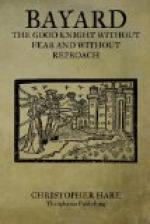It happened that the English King was accompanied by about 12,000 foot-soldiers, of whom 4000 were landed, but he had no horsemen, while Bayard commanded a detachment of nearly 1200 men-at-arms. The two armies came within a cannon-shot of each other, and Henry VIII., seeing his danger, dismounted from his horse and placed himself in the middle of the “landsknechte.” The French were only too eager to charge through the foot-soldiers, and Bayard implored the Governor of Picardy, under whose orders he was, to allow him to lead them on. “My lord, let us charge them!” he exclaimed; “if they give way at the first charge we shall break through, but if they make a strong stand we can always retire, for they are on foot and we on horseback.” But the lord of Piennes only replied: “Gentlemen, the King my master has charged me on my life to risk nothing, but only to defend his land; do what you please, but for my part I will never give my consent.”
The Good Knight, brought up in strict military discipline, was not one to break the law of obedience, and he yielded with bitter disappointment in his heart. The timid caution of the Governor of Picardy had thus lost him, in all probability, the chance of a splendid adventure, for the capture of King Henry VIII. at the very beginning of the war might have changed the whole history of Europe.
As it was, the King was suffered to pass on his way, but Bayard obtained leave to harass the retreating army, and with his company took possession of a piece of artillery called Saint John, for Henry VIII. had twelve of these big cannons, to which he gave the name of “his twelve apostles.”
The King of England reached the camp outside Therouanne in safety, and a few days later was joined by the Emperor Maximilian, who was welcomed with much feasting. Their combined forces are said to have amounted to 40,000 men, and they soon began a vigorous bombardment of the city, which was bravely defended with a strong garrison, who did their best with the limited means at their disposal. Therouanne was a strongly-fortified city, but the massive walls, which had formerly been impregnable, could not stand against a long siege with this new artillery.
The besieged city was very short of provisions and the great object of the French was to supply these; indeed Louis XII., who had advanced as far as Amiens, was sending constant orders that this must be done at any risk. At the same time he was very anxious to avoid a general engagement as his army would be no match for the combined English and Burgundian forces. French historians tell us that this was the cause of that disastrous encounter which, to their great annoyance, has been called the “Battle of Spurs.” They point out that the troops were not sent to fight, but only to revictual a besieged place, and that the King’s orders were that, if attacked, “they were to retreat at a walk, and if they were pressed, go from a walk to a trot, and from a trot to a gallop, for they were to risk nothing.”




